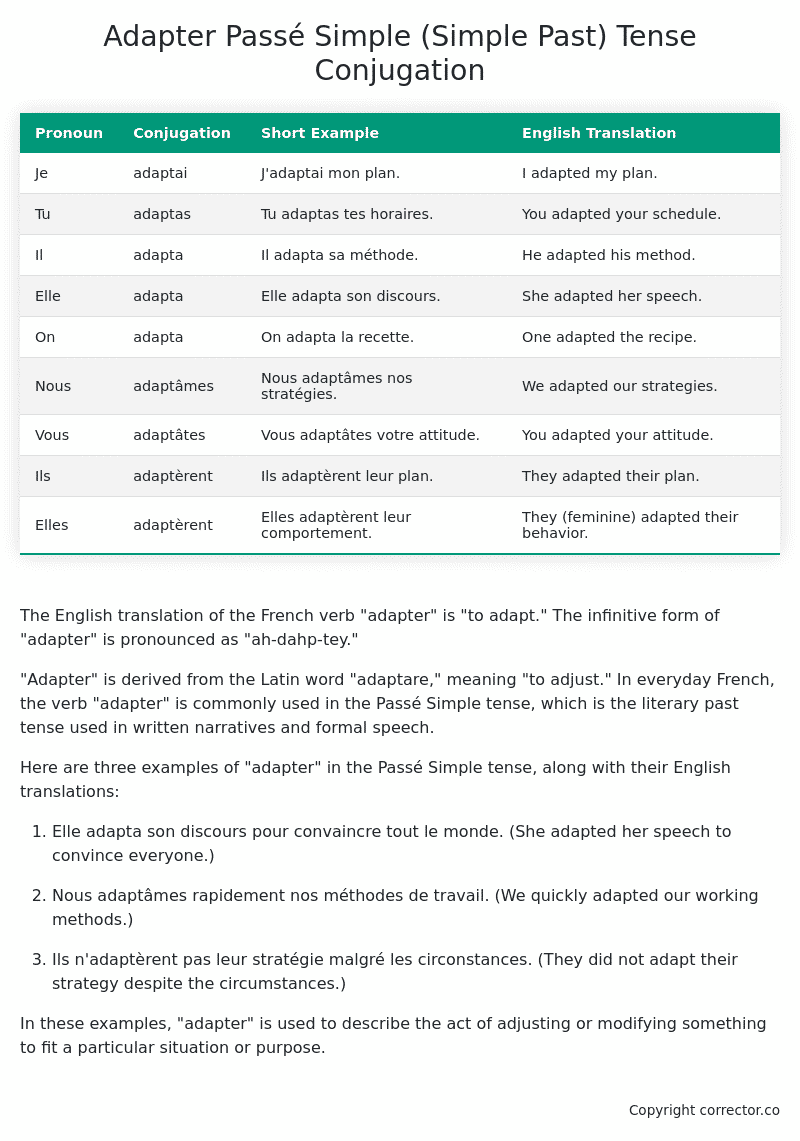Passé Simple (Simple Past) Tense Conjugation of the French Verb adapter
Introduction to the verb adapter
The English translation of the French verb “adapter” is “to adapt.” The infinitive form of “adapter” is pronounced as “ah-dahp-tey.”
“Adapter” is derived from the Latin word “adaptare,” meaning “to adjust.” In everyday French, the verb “adapter” is commonly used in the Passé Simple tense, which is the literary past tense used in written narratives and formal speech.
Here are three examples of “adapter” in the Passé Simple tense, along with their English translations:
-
Elle adapta son discours pour convaincre tout le monde.
(She adapted her speech to convince everyone.) -
Nous adaptâmes rapidement nos méthodes de travail.
(We quickly adapted our working methods.) -
Ils n’adaptèrent pas leur stratégie malgré les circonstances.
(They did not adapt their strategy despite the circumstances.)
In these examples, “adapter” is used to describe the act of adjusting or modifying something to fit a particular situation or purpose.
Table of the Passé Simple (Simple Past) Tense Conjugation of adapter
| Pronoun | Conjugation | Short Example | English Translation |
|---|---|---|---|
| Je | adaptai | J’adaptai mon plan. | I adapted my plan. |
| Tu | adaptas | Tu adaptas tes horaires. | You adapted your schedule. |
| Il | adapta | Il adapta sa méthode. | He adapted his method. |
| Elle | adapta | Elle adapta son discours. | She adapted her speech. |
| On | adapta | On adapta la recette. | One adapted the recipe. |
| Nous | adaptâmes | Nous adaptâmes nos stratégies. | We adapted our strategies. |
| Vous | adaptâtes | Vous adaptâtes votre attitude. | You adapted your attitude. |
| Ils | adaptèrent | Ils adaptèrent leur plan. | They adapted their plan. |
| Elles | adaptèrent | Elles adaptèrent leur comportement. | They (feminine) adapted their behavior. |
Other Conjugations for Adapter.
Le Present (Present Tense) Conjugation of the French Verb adapter
Imparfait (Imperfect) Tense Conjugation of the French Verb adapter
Passé Simple (Simple Past) Tense Conjugation of the French Verb adapter (You’re reading it right now!)
Passé Composé (Present Perfect) Tense Conjugation of the French Verb adapter
Futur Simple (Simple Future) Tense Conjugation of the French Verb adapter
Futur Proche (Near Future) Tense Conjugation of the French Verb adapter
Plus-que-parfait (Pluperfect) Tense Conjugation of the French Verb adapter
Passé Antérieur (Past Anterior) Tense Conjugation of the French Verb adapter
Futur Antérieur (Future Anterior) Tense Conjugation of the French Verb adapter
Subjonctif Présent (Subjunctive Present) Tense Conjugation of the French Verb adapter
Subjonctif Passé (Subjunctive Past) Tense Conjugation of the French Verb adapter
Subjonctif Imparfait (Subjunctive Imperfect) Tense Conjugation of the French Verb adapter
Subjonctif Plus-que-parfait (Subjunctive Pluperfect) Tense Conjugation of the French Verb adapter
Conditionnel Présent (Conditional Present) Tense Conjugation of the French Verb adapter
Conditionnel Passé (Conditional Past) Tense Conjugation of the French Verb adapter
Conditionnel Passé II (Conditional Past II) Tense Conjugation of the French Verb adapter
L’impératif Présent (Imperative Present) Tense Conjugation of the French Verb adapter
L’impératif Passé (Imperative Past) Tense Conjugation of the French Verb adapter
L’infinitif Présent (Infinitive Present) Tense Conjugation of the French Verb adapter
L’infinitif Passé (Infinitive Past) Tense Conjugation of the French Verb adapter
Le Participe Présent (Present Participle) Tense Conjugation of the French Verb adapter
Le Participe Passé (Past Participle) Tense Conjugation of the French Verb adapter
Struggling with French verbs or the language in general? Why not use our free French Grammar Checker – no registration required!
Get a FREE Download Study Sheet of this Conjugation 🔥
Simply right click the image below, click “save image” and get your free reference for the adapter Passé Simple tense conjugation!

Adapter – About the French Passé Simple (Simple Past) Tense
Formation
Usage
Narration
Historical Context
Interactions with other tenses
Passé Composé
Imparfait
Conditional and Subjunctive
Summary
I hope you enjoyed this article on the verb adapter. Still in a learning mood? Check out another TOTALLY random French verb conjugation!


